Finding Retail Gold in Boston – A Playbook for Site Selection Success
Written by: Clyde Christian Anderson
Why Boston Retail Site Selection Demands a Strategic Approach
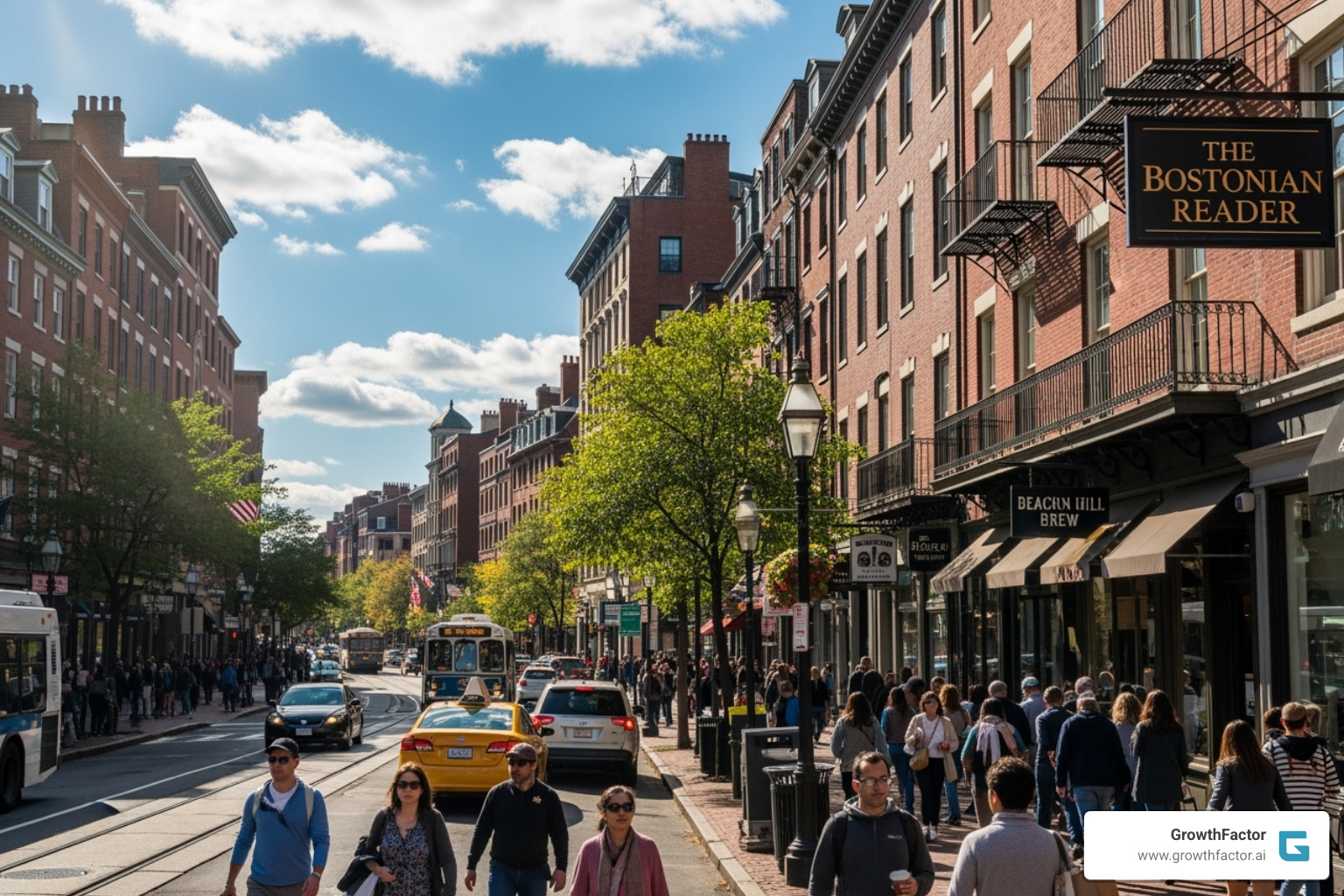
Retail site selection Boston presents unique challenges. The city's market combines historic preservation rules, dense urban logistics, and distinct consumer behaviors that demand specialized expertise.
Key Boston Retail Site Selection Essentials:
- Average build-out time: 4-8 months from permit to grand opening
- Historic district approvals: Additional 6-12 weeks for landmarks commission
- Visitor travel distance: 21 miles median (vs. 17 miles national average)
- Peak shopping hours: Noon-6 PM (38% of daily visits)
- Consumer spending focus: 50% restaurants, only 3% traditional shopping
- Retail vacancy rate: 3.5% (vs. 5.4% national average)
- Average asking rent: $24.32/sq ft (above national average)
Boston's retail landscape is shaped by rising tourism, which now exceeds pre-pandemic levels and drives spending in neighborhoods like Jamaica Plain, Roxbury, and Mission Hill. Yet, the city's complex permitting, historic preservation rules, and unique consumer preferences require data-driven decision making over intuition.
Successful retailers in Boston know location intelligence is more than demographics. Since visitors travel farther and favor experiences over goods, site selection must analyze foot traffic patterns, co-tenancy opportunities, and neighborhood-specific consumer behavior.
I'm Clyde Christian Anderson, CEO of GrowthFactor.ai, and I've spent over a decade in retail real estate before building our AI-powered platform that has evaluated 800+ locations for retail site selection Boston projects in under 72 hours. My experience ranges from ground-level retail operations to investment banking, giving me unique insight into both the operational challenges and financial implications of site selection decisions.
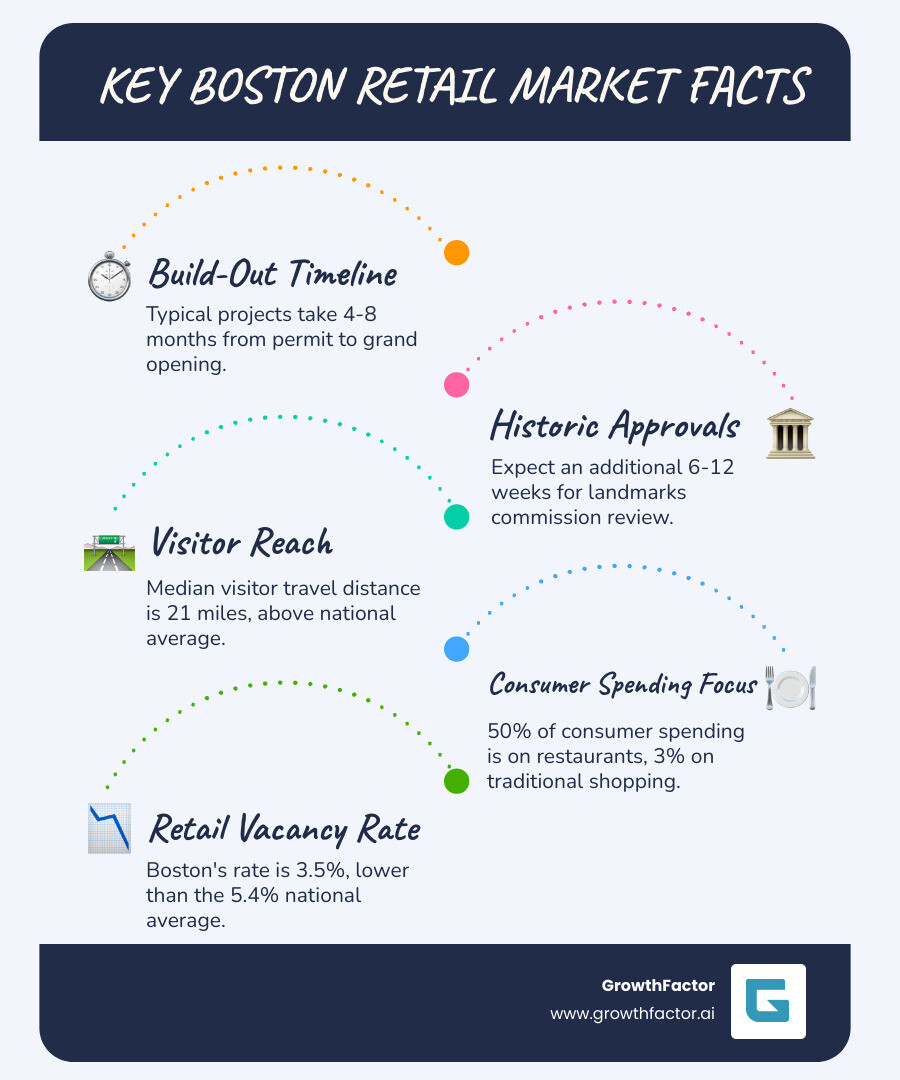
Why Boston's Retail Landscape is a Unique Challenge
Boston's retail market is a unique blend of history and innovation, creating distinct challenges. Installing modern fixtures in a centuries-old building illustrates why retail site selection Boston requires a different playbook.
The Boston Landmarks Commission's historic preservation rules can add months to an approval process. Combined with dense, narrow streets that challenge modern deliveries, the retail environment demands specialized expertise.
Retailers often underestimate Boston's winter weather, which can halt construction and deliveries, not just affect foot traffic. The city's aging infrastructure also frequently leads to costly surprises during tenant improvements.
These challenges require understanding Boston's unique neighborhood dynamics and regulatory environment. Each district has its own personality, from the upscale Back Bay to the vibrant North End, and successful retailers learn to work with these distinctive characteristics. For more insights, our Boston Retail Project Management guide offers detailed strategies.
The Historic Hurdle: Preservation and Permitting
Finding a perfect historic storefront in Boston can be retail gold, but it comes with headaches. Districts like Back Bay, Guide Hill, and the North End have great foot traffic and charm but require navigating the Boston Landmarks Commission's strict preservation guidelines.
Approvals for exterior changes, signage, and interior modifications can add 6 to 12 weeks to your timeline. A prime Newbury Street location can face months of delays if a proposed storefront fails to meet historical accuracy requirements. These delays create hidden costs from extended lease obligations, increased construction expenses, and postponed openings. Façade requirements might mean using specific, more expensive materials to maintain architectural features.
The architectural review process is about understanding the historical context of your location. Smart retailers build these timelines and costs into their initial site evaluation. Our Retail Site Selection Process guide helps you factor these considerations into your decision-making from day one.
The Density Dilemma: Logistics and Construction
Boston's narrow streets, built for carriages, create a logistical puzzle for modern retail construction, affecting material staging and timelines.
Material staging is a major challenge. With no storage space, contractors rely on costly just-in-time deliveries. Obtaining street permits for storage takes weeks, and parking restrictions add further delays. MBTA adjacency offers foot traffic but requires additional permits and coordination for construction. Utility coordination is also complex in dense areas with shared, century-old infrastructure.
The stakeholder coordination required—with neighborhood associations, city departments, and utility companies—can overwhelm retailers used to simpler developments. Successful retailers work with local experts who understand these constraints. For broader market insights, the latest Boston construction market analysis provides valuable context for planning your project.
The Modern Playbook for Retail Site Selection Boston
Choosing retail locations based on gut feelings is over. Successful retail site selection Boston now demands a sophisticated, data-driven approach to steer the city's complexities with precision.
Modern market analysis combines multiple data streams for a complete picture. This includes analyzing consumer behavior to understand purchasing drivers, foot traffic analysis to see who passes by, co-tenancy evaluation to find complementary neighbors, and competitive landscape analysis to avoid oversaturated markets.
Our approach to Data-Driven Site Selection transforms this complex puzzle into actionable insights, replacing assumptions with evidence.
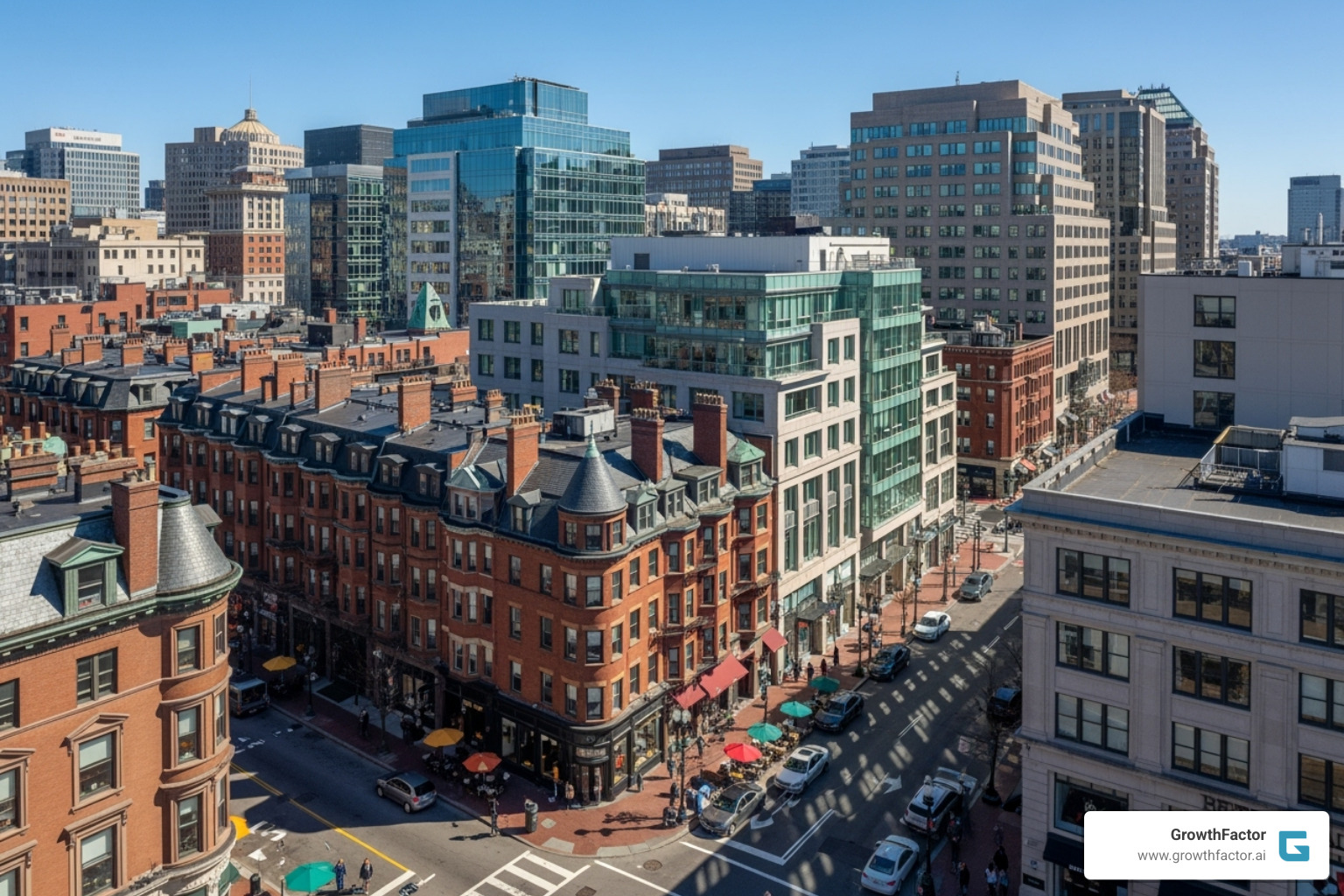
Decoding Boston's Consumer: Demographics and Behavior
Understanding Boston's unique consumer patterns is crucial for successful retail site selection Boston. The data reveals surprising stories.
Boston visitors travel a median distance of 21 miles (vs. 17 miles in other top metros), making it a true destination city. Peak activity occurs between noon and 6 PM, accounting for 38% of all visits. Critically, 50% of place visits are to restaurants, while only 3% are to traditional shopping destinations. This shows a clear preference for experiences over goods, a trend that intensifies on weekends when nightlife and dining traffic increases.
Rising tourism is fueling spending, with international travel exceeding pre-pandemic levels. Post-pandemic spending has surged in residential neighborhoods like Jamaica Plain, Roxbury, and Mission Hill, creating opportunities for retailers who think beyond traditional commercial districts. Boston's consumer behavior suggests a market that caters to coffee lovers, health enthusiasts, and beauty buffs. Understanding these patterns with detailed Site Selection Data is key to placing your store where your customers already are.
Leveraging Technology for a Competitive Edge in Boston
In a complex market like Boston, advanced technology is essential for competitive retail site selection Boston. Powerful tools that predict success are replacing outdated spreadsheets and intuition.
GIS mapping visualizes spatial data—like demographics, competitor locations, and transit routes—on a single map, revealing hidden patterns. Mobility data, from anonymized mobile signals, shows how people move through the city, revealing true trade areas.
The real game-changer is AI location intelligence. Our AI Agent Waldo processes multiple data streams, enabling teams to evaluate five times more sites efficiently. It can quickly identify lookalike locations based on your successful stores or find untapped market opportunities. Predictive analytics can forecast sales and measure cannibalization risks, allowing you to optimize your footprint before making costly commitments.
This is how AI is revolutionizing retail site selection, turning an intuition-based process into a data-driven science. We offer flexible plans starting with Core ($500), Growth ($1,500), and Enterprise options, so businesses of any size can leverage AI Location Intelligence for a competitive edge.
From Blueprint to Grand Opening: Navigating Boston's Build-Out Process
Once you've found the perfect spot, the build-out process begins. The journey from blueprint to grand opening in Boston is complex but rewarding.
Retail site selection Boston doesn't end at the lease signing. The build-out requires juggling timelines, managing budgets, and navigating a complex permitting process. It's an orchestration of historic preservation rules, modern retail needs, and unique logistical challenges. Success requires meticulous coordination, but the payoff—opening in a vibrant market—is worth it.
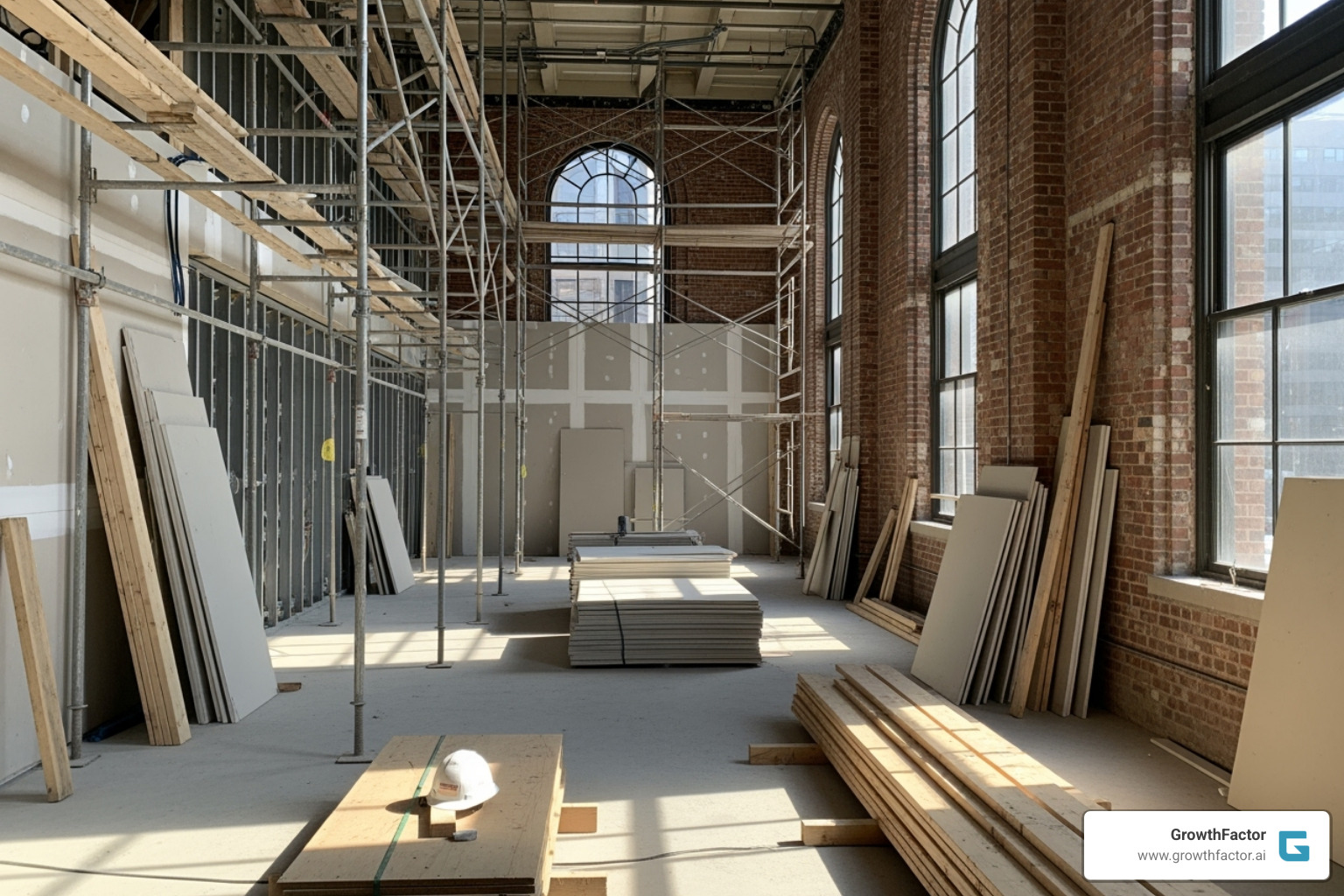
Mastering the Permitting and Zoning Labyrinth for retail site selection Boston
Boston's permitting process is challenging but navigable. The city's intricate zoning laws are shaped by centuries of development and a commitment to preservation.
Here are the timelines: building permits for major renovations typically take 4 to 8 weeks, while simple tenant improvements might clear in 2 to 4 weeks. If your location is in a historic district, add another 6 to 12 weeks for the Boston Landmarks Commission's approval.
Scheduling pre-application meetings with planning staff is a smart move. These meetings allow you to get feedback and identify potential issues early, saving months of delays. Staying informed about city initiatives like Boston's Squares + Streets plan is also essential for understanding how your location fits into the city's vision. This is a crucial part of effective Retail Site Location Analysis.
Managing Timelines and Hidden Costs in Boston
After permitting, how long is the build-out? Expect 4 to 8 months from permit application to grand opening for most Boston retail projects. However, several factors can extend that timeline.
One major variable is hazmat abatement. Older buildings often contain asbestos or lead paint, and remediation can add 2 to 6 weeks and thousands to your budget. Thorough due diligence can help you plan for these costs.
Historic renovations present their own challenges, from surprise structural issues to sourcing specialized materials. Experienced project managers are key to keeping budget variance under 5% through diligent oversight and robust contingency planning. They build solid plans for when the unexpected happens.
Smart financial planning includes accurate projections for your entire project lifecycle. Our guide on Sales Forecasting Tips for Retail Site Selection provides insights into creating comprehensive financial projections.
The Future of Boston Retail: Emerging Trends and Opportunities
Boston's retail landscape is changing. The future is about changing spaces to be meaningful for today's consumers. Retail site selection Boston is now about envisioning possibilities, not just evaluating existing conditions.
The trends we're seeing are fundamental shifts in how people want to interact with brands and spaces, from experiential retail to sustainable practices.
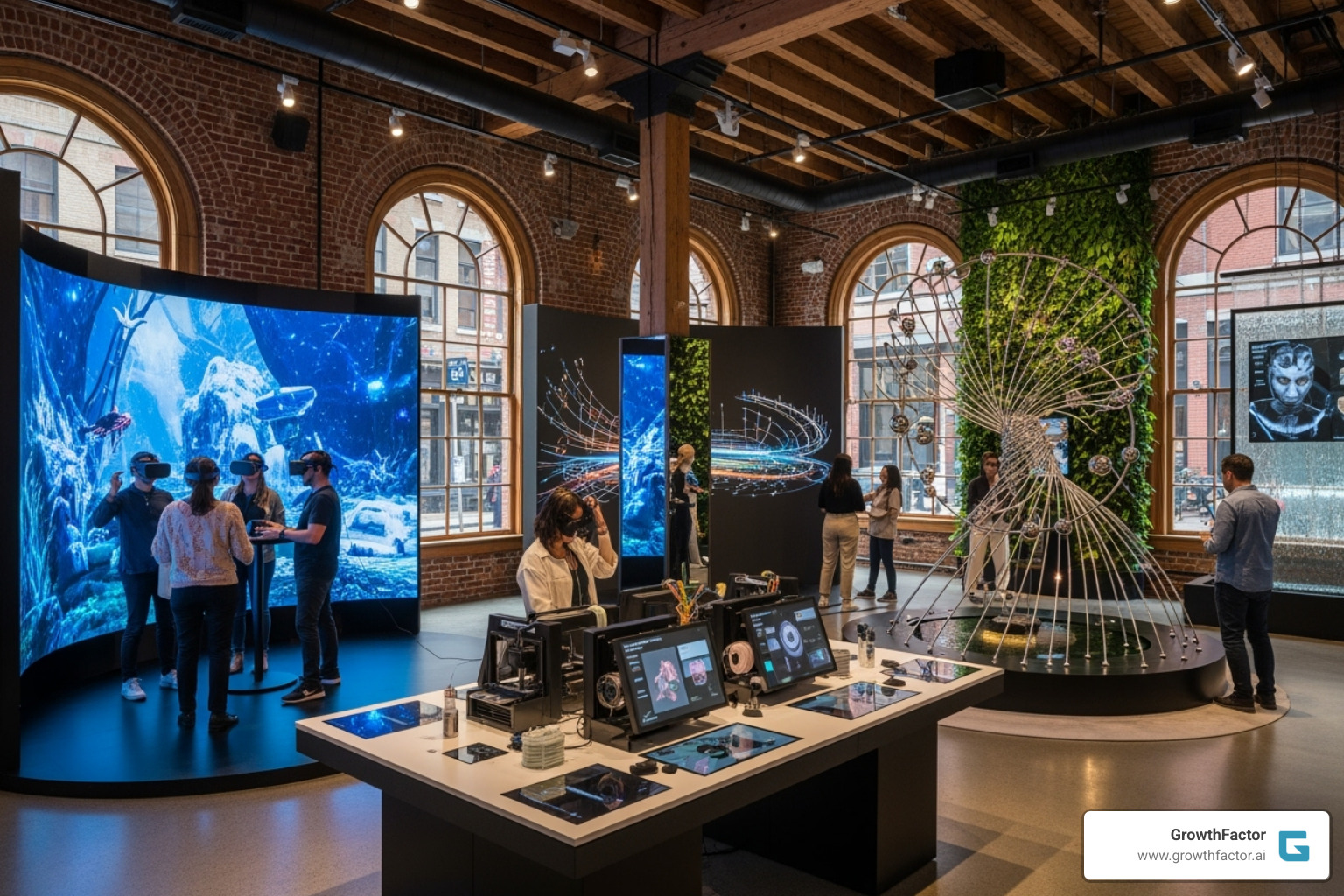
The Rise of Experiential and Sustainable Spaces
The fact that 50% of Boston visits are to restaurants shows that consumers value experiences over transactions. This has sparked the rise of experiential retail, where stores become destinations offering unique interactions, workshops, or brand activations. These spaces become community hubs that build lasting customer connections.
At the same time, sustainability is now a "must-have." Retailers are pursuing green building initiatives, LEED certification, and zero-waste construction. This connects with Boston's environmentally conscious consumers and improves brand reputation. Retailers are adopting sustainable practices like modular systems and material passports to track the lifecycle of building materials. Developing a comprehensive Retail Store Expansion Strategy is crucial for long-term success.
Adaptive Reuse: Turning Old into Retail Gold
Boston's rich architectural heritage offers a unique opportunity for adaptive reuse. Smart developers and retailers are converting existing structures into vibrant retail spaces while preserving their historical character, rather than building from scratch.
This approach turns "old into retail gold." Former industrial buildings and warehouses in areas like the Seaport District and Fenway have become thriving mixed-use destinations. Projects like the Lyrik Back Bay and Allston Labworks show how adaptive reuse can integrate retail into larger developments, creating unique shopping experiences.
The city supports this trend with programs like the $9 million SPACE Grant program to fill vacant storefronts. Even major retailers are opening smaller urban outposts in mixed-use developments. This data-driven approach to identifying opportunities aligns with modern retail site selection Boston strategies. Understanding the nuances of Real Estate Site Selection is essential for capitalizing on these unique opportunities.
Frequently Asked Questions about Retail Site Selection in Boston
What are the most important data points to analyze for a Boston retail location?
For successful retail site selection Boston, focus on these key data points:
- Foot Traffic Patterns: Analyze not just volume but also timing (38% of visits are noon-6 PM) and visitor paths to optimize staffing and operations.
- Consumer Spending Preferences: With 50% of visits going to restaurants vs. 3% to traditional shopping, ensure your concept aligns with Boston's experience-focused consumers.
- Visitor Origin Data: A median travel distance of 21 miles (vs. 17 nationally) indicates a larger-than-expected trade area for a destination city.
- Neighborhood-Specific Demographics: Each neighborhood has a unique profile; what works in the Seaport may not in the North End.
- Co-tenancy and Competition: Analyze nearby businesses to find synergistic opportunities and avoid oversaturated markets.
How long does it really take to open a retail store in a historic Boston district?
Opening a store in a historic Boston district takes longer than average. While a typical build-out is 4-8 months from permit to opening, a location in a historic district like Back Bay or the North End requires approval from the Boston Landmarks Commission, which adds 6 to 12 weeks to your timeline. Realistically, you should budget 6 to 10 months total for a historic district project. This can extend further if renovations uncover issues in the older building. It is critical to build this extended timeline into your business plan from the outset to avoid costly delays.
What is the biggest mistake retailers make when choosing a site in Boston?
The biggest mistake is underestimating the complexity and timeline of Boston's permitting process, particularly with historic preservation rules. Many retailers assume permitting is straightforward and fail to engage local experts early, leading to devastating delays and budget overruns. Boston's unique challenges—dense urban environment, aging infrastructure, and historic significance—require specialized knowledge. The smart approach is to budget for local experts from day one. Engaging permit expediters, experienced architects, and project managers with Boston track records is not an extra cost; it's insurance for your retail site selection Boston success.
Conclusion
Retail site selection Boston is a complex puzzle, but its challenges create a competitive moat for those who steer it strategically. Mastering historic preservation, urban logistics, and permitting turns obstacles into advantages.
Success in Boston, as we've learned from evaluating 800+ locations, requires combining deep local expertise with smart technology. Understanding that visitors travel 21 miles and favor experiences is just the start; you need AI to translate these insights into actionable decisions.
This is where our AI Agent Waldo excels. It automates analysis, allowing you to evaluate five times more sites, identify lookalike locations, and forecast sales before signing a lease. It replaces guesswork with data-driven confidence.
The future of Boston retail is bright, with trends like experiential retail and adaptive reuse creating new opportunities. The key is using the right blend of local knowledge and technology to decide quickly and effectively.
Ready to transform your approach to retail site selection Boston? Find how Waldo, the AI Agent for retail site selection, can transform your Boston expansion strategy and open up the city's full retail potential.
Citations
The human algorithm
Request Your demo
Schedule meeting
Or submit your information below and we'll be in touch to schedule.


